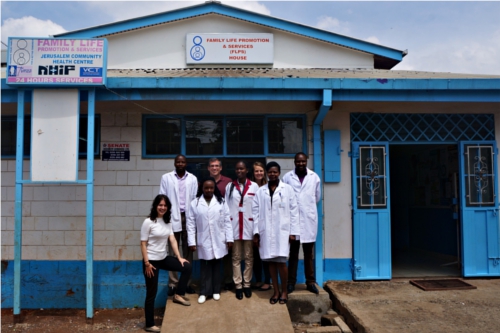Addressing Reproductive Coercion in HEalth Settings (ARCHES) Launches in Nairobi, Kenya Aiming to Improve Women’s Reproductive Autonomy
Addressing Reproductive Coercion in HEalth Settings (ARCHES) is a clinical-based intervention designed by Dr. Jay Silverman and Dr. Elizabeth Miller to increase women’s ability to make decisions around their own family planning use and pregnancies.1
Previous research from Dr. Silverman and his colleagues has found that women in controlling or abusive relationships often experience difficult using contraceptives or feel pressure to become pregnant when they do not want to be. Male partners of family members that wish to influence women’s reproductive choices do so through a set of specific behaviors. These behaviors, also known as reproductive coercion (RC), can include threats to coerce her to become pregnant against her will destroying or removing contraceptive methods, preventing women from obtaining contraception, and other means of coercion. Research has linked these behaviors to unintended pregnancy, repeated abortion, and intimate partner violence (IPV)5-7.
Below are some quotes from women seeking family planning services in Nairobi describing the behavior of male partners to control women’s reproduction 8.
“My sister’s case was even worse. Hers even got physical and her clothes were torn simply because the husband wanted a child. Not that she doesn’t have a child, but the husband thinks that she is taking too long to have another child as the on that they have is in Class Two.” – Family planning client, Nairobi
“I know of one man who puts his wife’s pills in hot water to reduce their effectiveness, and she conceived. Later, when she started getting nauseous, her husband told her she might be pregnant, and disclosed what he did.” – Family planning client, Nairobi
ARCHES works to combat reproductive coercion and improve women’s reproductive autonomy for those having facing male partner opposition to and interference with their use of contraceptives. The model focuses on delivering education and empowerment related to use of different contraceptive methods in ways that minimize risk for male partner detection of these methods and opportunities for him to interfere with her contraceptive use. Providers also discuss and provide as well as partner violence and utilization of local GBV survivor services. Those disclosing experiences of IPV are personally connected to a local gender based violence (GBV) services by providers. Importantly, all women, regardless of their experiences or what they choose to disclose are offered palm-size educational brochures to further reflect on what they heard and to share with other women.1
Over the part year, Dr. Silverman, his team at GEH, and a consortium of partners including the International Planned Parenthood Federation (IPPF), clinicians from Family Health Options Kenya (FHOK, the IPPF national affiliate in Kenya), and Population Council have adapted the ARCHES model for reproductive health care context of Kenya. Implementation and evaluation of the ARCHES Kenya intervention via a clustered controlled trial began in December 2017, after Dr. Silverman and his team and constortium of partners successfully trained providers at two clinics to deliver the intervention. Below, one client explains how her provider used strategies included in ARCHES Kenya to assist her to overcome reproductive coercion.
“… [My husband] took me to to the health facility and instructed the doctor to remove the implant from my arm because he wanted more children. I spoke to the doctor before the Norplant was removed that I did not want children. The doctor gave me an injection that lasts for 3 months. So my husband thinks that I’m not using contraception, and that’s what I am still using to date.” 1
Continuing to learn from women’s experiences in this demonstration, Dr. Silverman’s team is building the evidence for a model of care that improves women reproductive autonomy that is both sustainable and scalable. This work will form the foundation for ARCHES to be implemented at a larger scale within Kenya and across other low and middle-income (LMIC) country contexts. More broadly, this intervention is part of the Center on Gender Equity and Health’s (GEH) mission to improve the lives and reproductive health of women and girls globally through high quality research and programming.
Authored by: Jasmine Uysal, MPH
References:
- Miller E, Decker MR, McCauley HL, Silverman, JG. A family planning clinic partner violence intervention to reduce risk associated with reproductive coercion. Contraception. 2011;83(3):274-280. doi:10.1016/j.contraception.2010.07.013.
- Miller E, Jordan B, Levenson R, Silverman JG. Reproductive Coercion: Connecting the Dots Between Partner Violence and Unintended Pregnancy. Contraception. 2010;81(6):457-459. doi:10.1016/j.contraception.2010.02.023.
- Silverman JG, Raj A (2014) Intimate Partner Violence and Reproductive Coercion: Global Barriers to Women’s Reproductive Control. PLoS Med 11(9): e1001723.
- The American College of Obstetricians and Gynecologists (2013) Committee Opinion: Reproductive Health and Sexual Coercion. Obstet Gynecol 121: 411–415.
- Miller E, Silverman JG. Reproductive coercion and partner violence: implications for clinical assessment of unintended pregnancy. Expert review of obstetrics & gynecology. 2010;5(5):511-515. doi:10.1586/eog.10.44.
- Miller E, Decker MR, McCauley HL, Tancredi D, Levenson R, Silverman JG. (2010) Pregnancy coercion, intimate partner violence, and unintended pregnancy. Contraception 81: 316–322.
- Silverman JG, Decker MR, McCauley HL, Gupta J, Miller E, Raj A, Goldberg A. Male perpetration of intimate partner violence and involvement in abortions and abortion-related conflict. American Journal of Public Health 2010; 100:1415-7.
- Jay Silverman, Sabrina Boyce, et al. ARCHES: Reducing Adolescent and Adult Unintended Pregnancy and Partner Violence in Kenya Formative Research Report. 2017.




